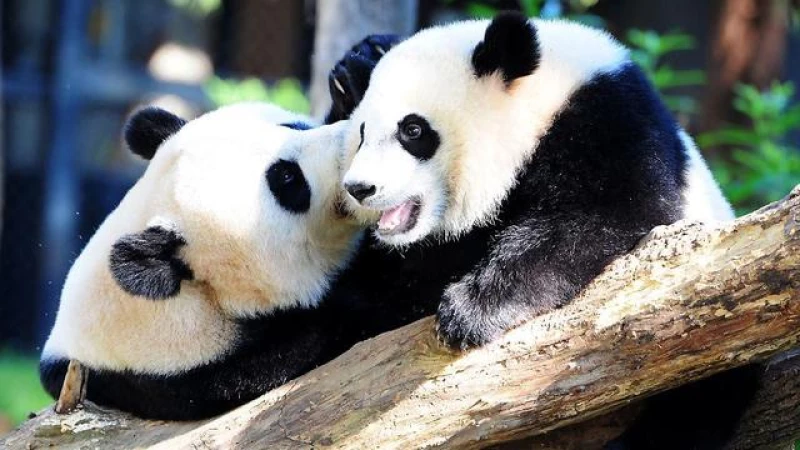Following the return of nearly all the giant pandas on loan at U.S. zoos, the San Diego Zoo has exciting news - they will be welcoming two new pandas from China. The pair is expected to arrive this summer.
The San Diego Zoo Wildlife Alliance shared on Sunday that their care team leaders recently visited China and met with the two giant pandas - Yun Chuan and Xin Bao, who will soon call the California zoo their home.
Yun Chuan, nearly 5 years old, is the grandson of Bai Yun, a beloved panda who resided at the San Diego Zoo for 23 years. His name, a blend of his grandmother's name and his place of origin, Chuan, holds special significance.
Xin Bao, at almost four years old, also hails from China's Wolong Shenshuping Panda Base. Her name translates to "new treasure of prosperity and abundance," and she is described by the zoo as "a gentle and witty introvert with a sweet round face and big ears."
Special Visit from Giant Pandas Yun Chuan and Xin Bao
"Our conservation partners in China shared photographs and personality traits of Yun Chuan and Xin Bao, but meeting them in person was so special," said Dr. Megan Owen, vice president of conservation science at San Diego Zoo Wildlife Alliance. "It's inspiring as people from around the world come together to conserve, protect, and care for these special bears, and we can't wait to welcome them to San Diego."
The China Wildlife and Conservation Association has lent pandas to the U.S. since 1972 – an agreement dubbed "panda diplomacy." Under the agreement, the Smithsonian National Zoo, Atlanta Zoo, Memphis Zoo and San Diego Zoo all received pandas and worked with China on research and conservation projects.
The agreement with the zoos was extended several times. In 1987, San Diego received two pandas for a 100-day visit, but eventually signed a 12-year agreement and received two pandas, named Bai Yun and Shi Shi, in 1996. The agreement kept getting extended and a total of six pandas were born at the zoo. All of them returned to China by 2019.
The Memphis Zoo had a 20-year loan agreement with China, which ended in April 2023, the Associated Press reported.
And the National Zoo in Washington, D.C. started receiving pandas in 1972. In 2023, their agreement ended and the zoo returned two pandas Mei Xiang and Tian Tian, who had been at the zoo since 2000, and their baby Xiao Qi Ji, who was born in 2020.
The Atlanta Zoo is the sole zoo in the United States that still houses pandas on loan from China. Their agreement, established in the mid-1990s, is set to expire in 2024, and they are expected to return their pandas Lun Lun and Yang Yang, along with their offspring, Ya Lun and Xi Lun, by the end of the year.
The San Diego Zoo recently held a meeting with conservation partners from the China Wildlife Conservation Association to discuss various research and conservation programs. Over the course of 30 years, the zoo has collaborated with conservation institutions in China to delve into the reproductive behavior, physiology, nutritional requirements, habitat needs, and genetics of pandas.
The zoo even formulated a panda milk recipe, which, in conjunction with other research efforts, has significantly boosted the survival rates of baby pandas from a mere 5% to an impressive 95%. Additionally, they achieved the milestone of conducting the first successful artificial insemination of a giant panda outside of China.
"Our longstanding partnership has exemplified how, through collective efforts, we can accomplish feats that were once deemed unattainable," stated Owen. "Our mutual objective is to forge a sustainable future for giant pandas."
As of 2023, the global panda population stands at a mere 1,864, primarily concentrated in China's Sichuan Province. Thanks to successful breeding programs, the previously endangered species was reclassified as "vulnerable" by the International Union for Conservation of Nature in 2017, as per the World Wildlife Fund.







